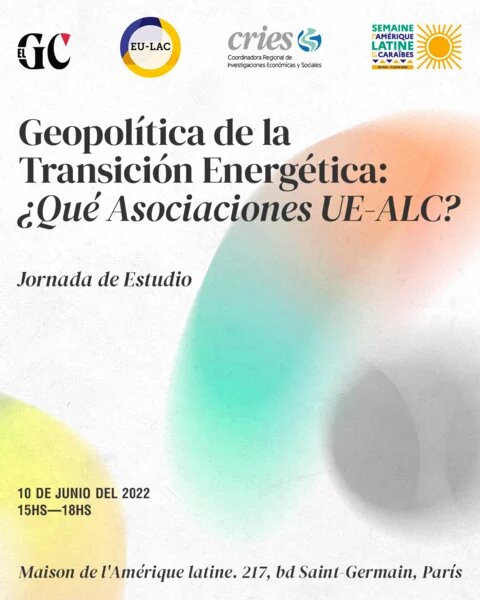In the framework of the V. Annual Call for the co-organisation of events on topics relevant to the bi-regional partnership between the European Union and Latin America and the Caribbean, the international colloquium "Geopolitics of Energy Transition: What EU-LAC Partnerships?" This colloquium is co-organised by La Coordinadora Regional de Investigaciones Económicas y Sociales (CRIES), the magazine Le Grant Continent and the EU-LAC Foundation and is part of the 9th edition of the Semaine de l'Amérique latine et des Caraïbes (#SALC2022, 26 May-11 June) promoted by the French Ministry for Europe and Foreign Affairs.
The event aims to analyse the geopolitical dimension of the energy transition and its implications for partnerships between the European Union (EU) and Latin America and the Caribbean (LAC). At the global level, efforts to materialise an energy transition away from hydrocarbons affect not only the energy landscape but also the economic, political and geopolitical ones. To the constant emergence of new challenges, through which new fault lines are being drawn between the different actors in this transition, must now be added the impacts of Russia's invasion of Ukraine.
In both Europe and LAC, the predominant discourses on energy transition (whether expressed from a more radical perspective or based on the possibilities offered by green productive development) are structured around a conception of the energy transition as the motor of a renewed process of democratisation with greater social inclusion; a process that has not been able to materialise with the development models promoted during the neoliberal stage of the process of capitalist accumulation1. While the potential for social justice of a transition reflected in these terms is real, as are the possibilities it opens up for new positioning of EU-LAC relations, the configuration of the post-carbon world is a space of strategic rivalries.
The deeply conflictive process of disarmament and dismantling of fossil fuel infrastructures, which now constitutes the "ecology of war", a concept detailed by Pierre Charbonnier in our columns, an indispensable weapon for Europe in the context of the war in Ukraine, implies changes in extractive pressures, a shift in the zones of dispute and, therefore, a modification of the power relations between strategic actors. The geopolitical dimension of the energy transition, which until now involved a struggle for the capture of not only economic but also symbolic benefits between the major powers, especially China and the United States, has taken on a new magnitude.
In this context, how can the geopolitical dimension of the transition be incorporated, into the context of the war in Ukraine, to maximise its potential for social justice and in terms of greater strategic autonomy? How is the war expressed and what concrete impacts does it have on the energy transitions in Europe and Latin America? What place does the strategic rivalry between the United States and China for the capture of the economic and symbolic benefits of the transition occupy in all this? Can Europe's climate ambition be transformed into diplomatic ambition and structure a renewed cooperation agenda with LAC? What challenges does the war in Ukraine now pose for this renewed cooperation agenda? Does the region's place in this eventual New Deal recognise the potential of its contributions to the environmental agenda? What are the region's contributions to the environmental agenda?
The event will be held in a hybrid format, with the possibility of attending the event in person at the Maison de l'Amérique latine in Paris (limited capacity) or virtually.
More information in due course.
